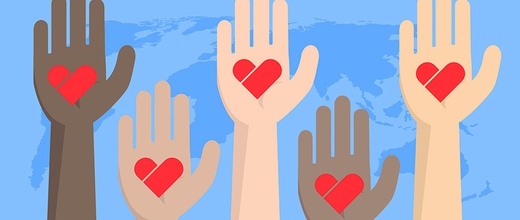The views expressed in our content reflect individual perspectives and do not represent the authoritative views of the Baha'i Faith.
Caring for the world’s refugees, for the shelterless and homeless, is a tough business, because the needs normally far outweigh the available means.
Numerous governmental and charitable organizations try their best to aid those refugees, providing land, temporary shelter, food, drink, clothing, schooling and more, all so the world’s expanding refugee camps can temporarily care for the displaced millions.
Recently the United Nations’ Refugee Agency, the UNHCR, reported that the number of displaced people in the world had risen to 65.6 million—more than the entire population of the United Kingdom. This astonishing number, an increase of 300,000 from the year before, is the largest number of refugees ever recorded.
What can one person do about this global crisis? Is it even our responsibility to act, or should we leave the task to agencies and governments?
From a Baha’i perspective, helping homeless refugees is everyone’s business. Baha’u’llah, himself an exiled refugee, wrote:
O ye rich ones of the earth! Flee not from the face of the poor that lieth in the dust, nay rather befriend him and suffer him to recount the tale of the woes with which God’s inscrutable Decree hath caused him to be afflicted. By the righteousness of God! Whilst ye consort with him, the Concourse on high will be looking upon you, will be interceding for you, will be extolling your names and glorifying your action. – Gleanings from the Writings of Baha’u’llah, p. 314.
Abdu’l-Baha, who also became a refugee and a prisoner when his father Baha’u’llah was repeated exiled and imprisoned, said:
May you all be united, may you be agreed, may you serve the solidarity of mankind. May you be well-wishers of all humanity. May you be assistants of every poor one. May you be nurses for the sick. May you be sources of comfort to the broken in heart. May you be a refuge for the wanderer. May you be a source of courage to the affrighted one. Thus, through the favor and assistance of God may the standard of the happiness of humanity be held aloft in the center of the world and the ensign of universal agreement be unfurled. – Abdu’l-Baha, The Promulgation of Universal Peace, p. 425.
As just one example of how dire the world’s ongoing refugee crisis has become, let’s look at the small country of Lebanon. At 4,036 square miles, it is one of the world’s smallest nations in terms of land area. During the 1960s Lebanon was known as “the Switzerland of the East,” and Beirut, its capital, “The Paris of the Middle East.”
As we know, though, Syria is located to Lebanon’s north and east, and Israel to the south. Lebanon has long been plagued by sectarian violence and civil war, but in 1990 the civil war ended, with nearly one million Lebanese displaced. Parts of Lebanon were left in ruins, and Syria remained an occupier until 2005. A series of high-profile assassinations of Lebanese leaders followed, making it hard to form a stable government. Then, in 2012 the Syrian civil war threatened to spill over into Lebanon, and by 2013 over 677,000 Syrian refugees crossed the Lebanese border for its relative safety. Today Lebanon hosts over 1 million Syrian refugees, roughly one-seventh of that nation’s previous population.
But Lebanon is not the only country with displaced and homeless persons of every sex and age. How can we, as individuals, deal with these pressing issues, and offer help to the displaced, the homeless, the refugee? Who could serve, personally, as a role model for how to help these helpless masses?
In 1932, Shoghi Effendi wrote about a Baha’i who did just that:
The outbreak of the Great War gave her yet another opportunity to reveal the true worth of her character and to release the latent energies of her heart. The residence of Abdu’l-Baha in Haifa was besieged, all throughout that dreary conflict, by a concourse of famished men, women and children whom the maladministration, the cruelty and neglect of the officials of the Ottoman Government had driven to seek an alleviation to their woes. From the hand of [Bahiyyih Khanum, Abdu’l-Baha’s sister], and out of the abundance of her heart, these hapless victims of a contemptible tyranny, received day after day unforgettable evidences of a love they had learned to envy and admire. Her words of cheer and comfort, the food, the money, the clothing she freely dispensed, the remedies which, by a process of her own, she herself prepared and diligently applied—all these had their share in comforting the disconsolate, in restoring sight to the blind, in sheltering the orphan, in healing the sick, and in succoring the homeless and the wanderer. – Shoghi Effendi, Baha’i Administration, p. 193.
The Great War was World War I, the setting Palestine, the Greatest Holy Leaf the title for Bahiyyih Khanum, the elder sister of Abdu’l-Baha.
During World War I, when Palestine was cut off from the rest of the world and famine threatened, both Bahiyyih Khanum and Abdu’l-Baha became shining examples of caring for the poor and needy, the dispossessed, the hapless and the refugee—the kind of example that starts in the hearts of individuals, and carries throughout those groups and nations providing help and aid even today:
Nor were the British authorities slow to express their appreciation of the role which Abdu’l-Baha had played in allaying the burden of suffering that had oppressed the inhabitants of the Holy Land during the dark days of that distressing conflict. – Shoghi Effendi, God Passes By, p. 306.
The British government knighted Abdu’l-Baha for his work staving off hunger and starvation among the people of Palestine during the war.
Only personal involvement, love and unity—unity of thought, will and action—can hope to make a start toward permanent solutions. That unity, that worldwide fellowship, that love, can come from the spiritual and practical solutions proclaimed by Baha’u’llah.

















Comments
Sign in or create an account
Continue with Facebookor